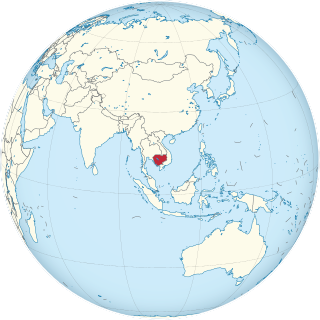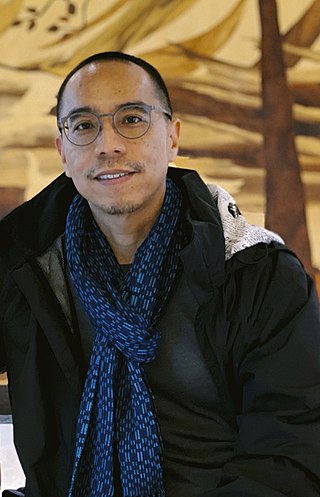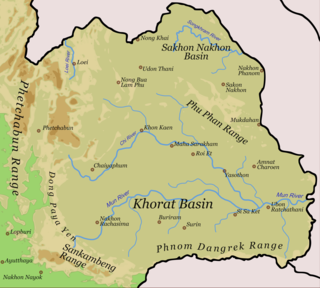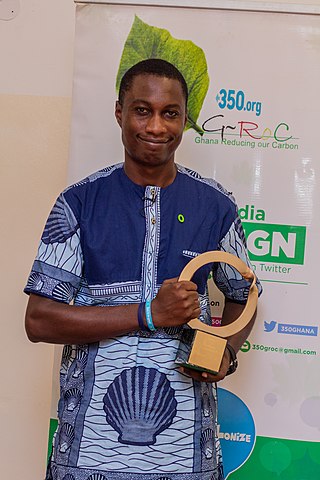Related Research Articles

Cambodia is a country in mainland Southeast Asia. It borders Thailand, Laos, Vietnam, the Gulf of Thailand and covers a total area of approximately 181,035 km2 (69,898 sq mi). The country is situated in its entirety inside the tropical Indomalayan realm and the Indochina Time zone (ICT).

The Mekong or Mekong River is a trans-boundary river in East Asia and Southeast Asia. It is the world's twelfth-longest river and the third-longest in Asia with an estimated length of 4,909 km (3,050 mi) and a drainage area of 795,000 km2 (307,000 sq mi), discharging 475 km3 (114 cu mi) of water annually. From its headwaters in the Tibetan Plateau, the river runs through Southwest China, Myanmar, Laos, Thailand, Cambodia, and southern Vietnam. The extreme seasonal variations in flow and the presence of rapids and waterfalls in the Mekong make navigation difficult. Even so, the river is a major trade route between Tibet and Southeast Asia. The construction of hydroelectric dams along the Mekong in the 2000s through the 2020s has caused serious problems for the river's ecosystem, including the exacerbation of drought.

The Goldman Environmental Prize is a prize awarded annually to grassroots environmental activists.

Apichatpong Weerasethakul is a Thai independent film director, screenwriter, film producer and Professor at Tama Art University in Tokyo. Working outside the strict confines of the Thai film studio system, Apichatpong has directed several features and dozens of short films. Friends and fans sometimes refer to him as "Joe".

The Mekong River Commission (MRC) is an "...inter-governmental organisation that works directly with the governments of Cambodia, Laos, Thailand, and Vietnam to jointly manage the shared water resources and the sustainable development of the Mekong River". Its mission is "To promote and coordinate sustainable management and development of water and related resources for the countries' mutual benefit and the people's well-being".

The Mekong giant catfish, is a large, threatened species of catfish in the shark catfish family (Pangasiidae), native to the Mekong basin in Southeast Asia and adjacent China. It is considered critically endangered due to overfishing and habitat loss.

The Ing River is a tributary of the Mekong River in the northern part of Thailand. It has its source in Doi Luang, Phi Pan Nam Range, in Mae Chai District, Phayao Province. The Ing flows through the plain area of Thoeng District.

The Songkhram River is a tributary of the Mekong River. It originates in the hills between Nong Han District, Udon Thani Province and Sawang Daen Din District, Sakon Nakhon Province. It flows through Seka District, Wanon Niwat, and Si Songkhram District and empties into the Mekong River in tambon Chai Buri, Tha Uthen District, Nakhon Phanom Province. It is 420 kilometres (260 mi) long.

The Greater Mekong Subregion, (GMS) or just Greater Mekong, is a trans-national region of the Mekong River basin in Southeast Asia. The region is home to more than 300 million people. It came into being with the launch of a development program in 1992 by the Asian Development Bank that brought together the six Asian countries of Cambodia, China, Laos, Myanmar (Burma), Thailand, and Vietnam.
Yu Xiaogang is a Chinese environmentalist. He was awarded the Goldman Environmental Prize in 2006 for his efforts in "creating groundbreaking watershed management programs while researching and documenting the socioeconomic impact dams had on local Chinese communities". He is among the six winners of the 2009 Ramon Magsaysay Awards, considered by many to be the Asian equivalent of the Nobel prize. He completed his Master's from the Asian Institute of Technology(AIT) in Thailand and his award citation says:
His interest in the environment was cultivated during a stint in the Yunnan Academy of Social Sciences, and was further deepened when he attended the Asian Institute of Technology, where he earned a master's degree in watershed management.
Living River Siam is a Thai non-governmental organization (NGO) which analyzes the impact of Thailand's various dam projects and coordinates the research of indigenous peoples to give Thai villagers the power to document the influence of local rivers and dams. Founded in 1999, it gained prominence during the Pak Mun Dam study period in 2001, when it developed a method for instructing villagers on how to document the effects of the dammed river on their lives. When the Thai government proposed other dam sites, Living River Siam took its research methods to the villages surrounding those sites as well. Today, the organization works with other NGOs in Southeast Asia to counter government-sponsored research that encourages dam construction.

The estimated hydropower potential of Mekong River Basin about 58,930 Megawatts (MW). As of February 2024, there are an estimated 167 Hydropower Plants (HPPs) in the Mekong, with a combined installed capacity of some 36,376.3 MW. An additional 20 HPPs are currently under construction and at various stages of completion. These have a combined installed capacity of an additional 4,535.5 MW.

The Xayaburi Dam is a run-of-river hydroelectric dam on the Lower Mekong River, approximately 30 kilometres (19 mi) east of the town of Sainyabuli (Xayaburi) in northern Laos. Commercial operation of the dam started in October 2019. The main purpose of the dam is to produce hydroelectric power, 95% of which is to be purchased by the Electricity Generating Authority of Thailand (EGAT). The project is surrounded in controversy due to complaints from downstream riparians and environmentalists. Preliminary construction began in early-2012, but work on the dam itself was suspended shortly thereafter due to complaints from Cambodia and Vietnam downstream. After making modifications to the dam's design, Laos started construction with a ceremony on 7 November 2012. The Xayaburi Dam is the first of the 11 dams planned on the lower Mekong.
The Don Sahong is a hydroelectric dam commissioned in 2020 on the Mekong River in Siphandone area of Champasak Province, Laos, less than two kilometers upstream of the Laos–Cambodia border.
This page describes energy and electricity production, consumption and import in Laos.

Ng Cho-nam, SBS, JP, was a Hong Kong environmental studies scholar and conservationist who taught as an associate professor within the Department of Geography at the University of Hong Kong. He served as a top advisor on numerous Hong Kong government committees in areas of conservation, sustainable development, environmental protection, urban planning, and was an active member in various environmental NGOs. He was the director of the Conservancy Association from 2000 to 2019.

Chibeze Ezekiel is a Ghanaian environmental activist and a 2020 Goldman Environmental Prize award recipient for Africa. He is known to have challenged the Ghanaian Ministry of Environment to cancel the construction of a coal plant through activism.

Environment and Ecology Bureau is a policy bureau of the Government of Hong Kong. The agency was established on 1 July 2022. The current Secretary for Environment and Ecology is Tse Chin-wan.
Maida Bilal is a Bosnian environmental activist known for leading a group of women in a 503-day blockade ending in December 2018. The group resisted the movement and placement of heavy equipment resulting in the cancellation of the construction of two dams on the Kruščica river. This action helped to preserve and safeguard the Kruščica river, an important source of water and resources for the village of Kruščica and approximately 145,000 inhabitants of the two nearby towns, from being irreversibly damaged by the construction of the dams.
Paul Sein Twa is a Karen environmentalist and indigenous activist from Myanmar who works to preserve the culture and environment of the Salween River basin. He co-founded the Karen Environmental and Social Action Network (KESAN) in 2001 to help Karen indigenous communities the preservation and protection of their land and heritage. He received the Goldman Environmental Prize in 2020 for his efforts.
References
- 1 2 3 4 Cottam, Bryony (2022-05-26). "Retired schoolteacher Niwat Roykaew wins the 2022 Goldman Environmental Prize". Geographical. Retrieved 2022-12-25.
- 1 2 3 "Niwat Roykaew - Goldman Environmental Prize". 2022-04-19. Retrieved 2022-12-25.
- 1 2 "Niwat award a call to act". Bangkok Post. 27 May 2022. Retrieved 2022-12-25.
- 1 2 "Chinese firm fails to convince locals over Mekong blasting". The Third Pole. 2019-01-29. Retrieved 2022-12-25.
- ↑ "Defender of the Mekong, retired Thai teacher wins 'Green Nobel' | Coconuts". Coconuts. Retrieved 2022-12-25.
- 1 2 AsiaNews.it. ""Green Nobel" goes to activist who saved Mekong River rapids". www.asianews.it. Retrieved 2022-12-25.
- ↑ "Thai Mekong Campaigner Awarded Prominent Environmental Prize". thediplomat.com. Retrieved 2022-12-25.
- ↑ llevin (2020-02-06). "Victory on the Upper Mekong: Thai Cabinet Terminates Rapids Blasting Project". International Rivers. Retrieved 2022-12-25.
- ↑ School, The Mekong (2022-05-27). "Chiang Khong Conservation Group Director Niwat Roykaew is awarded the 2022 Goldman Environmental Prize". The Mekong School. Retrieved 2022-12-25.